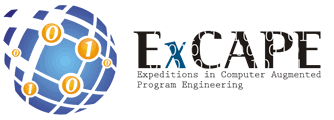Scope and Topics of Interest
The workshop aims to bring together researchers interested in the broad area of synthesis of computing systems. It aims to foster the development of frontier techniques in automating the development of computing systems and is inclusive in its interpretation of the term synthesis.
Contributions of interest include
- algorithms, complexity and decidability analysis, as well as
- reproducible heuristics, implemented tools, and experimental evaluation.
Computation models include functional, reactive, hybrid and timed systems.
Application domains include software, hardware, embedded, and cyberphysical systems. Identifying, formalizing, and evaluating synthesis in particular domains is encouraged.
Of interest are approaches that explore alternative development methods, as well as approaches that improve upon the automation of design, compilation, and optimization techniques currently in widespread use. All appropriate underlying methods are of interest, including above formal methods and techniques that build upon computer-aided verification, but also machine learning and data mining techniques.
All formalizable forms of specifications of potential practical interest are considered, including contracts, temporal logic specifications, quantitative objectives, partial systems, and (possibly symbolic) input/output examples.
Of great interest is understanding and productively making use of relationships between synthesis and related topics such as repair, fault localization, testing, discovery (synthesis) of inductive invariants, parameter optimization, constraints solving, theorem proving (including SMT, superposition-based, inductive, and higher-order theorem proving, as well as automated generation of lemmas and knowledge discovery).We strongly encourage submissions that will connect current advances in synthesis and the area of inductive programming.
